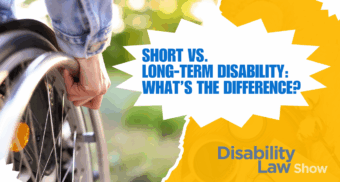Disability Law Show – Season 6 Episode 9
Episode Summary
COMMON QUESTIONS ABOUT DISABILITY BENEFITS on Season 6 Episode 09 of the Disability Law Show with disability lawyer and Partner James Fireman.
Watch above to discover the steps you must take when the insurance company cuts off or denies your long-term disability claim in Canada, on the only disability law show on TV and radio in the country.
Episode Notes
Claiming disability benefits due to long-COVID
I’ve had long-COVID for over a year now after contracting acute COVID-19. My claim for long-term disability benefits was denied. I’m unsure why this happened or what I can do next.
- COVID-19 influenced disability claims: It is difficult to prove cases of long covid disability for many claimants, due to the inability to find objective medical evidence. Symptoms of long-term COVID-19, such as fatigue and headaches, are common in other medical conditions. A lack of diagnosis is not required to qualify for long-term disability benefits.
Appealing LTD denial several times
After being diagnosed with a degenerative disease I’ve undergone every kind of treatment and medication my doctors have prescribed. I’m exhausted all the time, and I can’t think straight. I was approved for short-term disability benefits but denied LTD. I appealed twice but both appeals were rejected. What else can I do?
- Repeated appeal attempts denied: Insurance companies created the appeals process to ensure they remain in control of a disability claim. Appeals are rarely successful and typically conducted internally, and not by an objective third party. Appeals waste valuable time for claimants as pursuing a legal claim must be done for up to two years after the initial denial.
Common questions about Disability Benefits
- A lack of “objective medical evidence”: A lack of “objective medical evidence” means evidence that can be proven in absolute terms, i.e. an x-ray showing a broken bone. There are no provisions in disability policies that typically require objective medical evidence. Some medical conditions, such as mental health illnesses, rarely possess objective medical evidence.
- Qualifying period or an elimination period: All long-term disability policies will have a period after a claimant begins a medical leave before LTD benefits will be payable. This period typically lasts between four to six months. Claimants should determine whether or not they have short-term disability coverage to assist during the elimination period.
- A loss of employment: A loss of employment does not lead to an automatic end to disability benefits. Claimants’ entitlements to benefits are crystallized as soon as medical leave begins. As long as claimants remain continuously disabled, they will still be entitled to long-term disability benefits. It is important to keep in mind, however, that severance payments can affect LTD benefits.
Individuals’ health problems are deemed situational
I suffer from severe anxiety that was triggered by harassment and bullying by coworkers. My psychologist recommended I take time off from my executive role. Despite their support, I was denied LTD. The insurer keeps insisting that my health problems are a workplace-related issue. What should I do?
- Generalized vs situational mental health conditions: Insurance adjusters often dispute mental health claims, particularly if they arise as a result of a toxic work environment. It is beneficial to insurers if a medical condition is deemed “work-related” and symptoms do not occur outside of the workplace. A generalized mental health disorder, however, can be triggered as a result of harassment and bullying.
Not “totally disabled” after a serious car accident
A few months ago, a truck hit me at an intersection, leading to severe migraines, depression, and a foot injury that affected my walk. Despite this, my Long-Term Disability claim was denied, as it wasn’t considered a “total disability.” What options do I have?
- Generalized vs situational mental health conditions: The term “total disability” is defined in a long-term disability policy. Many individuals often incorrectly assume that “total disability” means they are not able to function in any capacity. To be deemed “totally disabled”, claimants have to be able to prove they are unable to work in their occupation.
PREVIOUS EPISODE: Disability Law Show S6 E08 – Guide to disability benefits and depression




